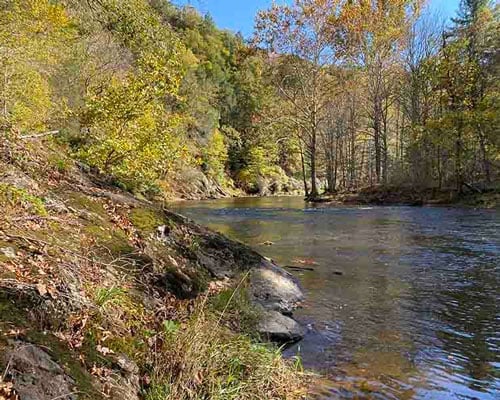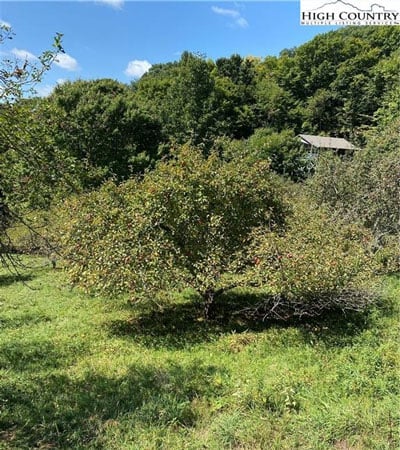Everyone wants their own piece of heaven in the North Carolina mountains. With the short supply of homes available in the High Country, the land is becoming a hot commodity.
“Here’s to the land of the longleaf pine, The summer land where the sun doth shine, Where the weak grow strong and the strong grow great, Here’s to “Down Home,” the Old North State!”
Let’s take a look at all the things you’ll need to know before buying North Carolina mountain land and properties.
Due Diligence for Land Purchases
Why not work surrounded by the beauty of the Blue Ridge Mountains in a quiet retreat unique to you? Boone and the surrounding areas have been inundated with buyers looking for a primary home away from the hustle and bustle of city life, investment properties, and even properties for retirement.
You probably have a use in mind for the property you’re buying. When buying any property you must do go through the Due Diligence process. Doing your due diligence can identify and verify if the property is the right fit for you and your investment.
Here are 3 questions you’ll need to ask before a land purchase.
- What is the land or lot going to be used for? (Are you going to build a home, commercial building, business, mini-farm, or use it for recreational use?)
- Do you have a realistic financial budget for purchasing the land?
- Am I allowed to do what I want with the land once I own it?
Types of Land Investments
There are several different types of land investments. Properties are classified based upon how the owner can use their property.
Residential Developments and Subdivisions
Large tracts of land can be divided into lots and sold with the purpose of building a residential house on each lot.
Each lot owner may have to abide by POA or Home Owner Association (HOA) dues, covenants, and restrictions. Some rules may include architectural plan approval, building guidelines, noise nuances, fencing and landscaping guidelines, short-term and long-term rental policies, water and sewer rights.
Most residential developments offer privately maintained roads, access to utilities, common areas such as walking trails, picnic areas, pools, and etc.
Raw Land
Raw Land is undeveloped and simply in its most natural state. In the High Country of North Carolina, undeveloped properties are wooded forests and are used for recreational activities such as hunting, hiking, and camping.
To be classified as raw land a property has not been used for:
- Farming, crops, or livestock,
- Any improvements, buildings, sheds, fences, or maintained trails
- Public utility access,
- Driveway or road access

Raw land may be used to build a future house. Sprawling Appalachian hills make it the perfect place to start farming livestock, tending crops, beekeeping, or growing your own Christmas Trees!
Before you buy raw land you’ll want to see if there are restricted accesses to the property. It’s common in the High Country of North Carolina for remote, mountainous raw properties to have no access via roads.
Learn more about what it takes to live in rural Appalachia to prepare for some other country quirks you might not expect!
Commercial Development
If you’re buying land with the intent of adding a storefront, you’ll need to ensure that the property is zoned for commercial development and use.
Land used for commercial development or businesses is often used by the community to generate a profit. Different cities have different restrictions on how and where these properties can be developed.
Examples of commercial development are warehouses, hotels, retail stores, office buildings, medical centers, parking lots, and malls.
 5 Things to Consider Before Buying Land
5 Things to Consider Before Buying Land
While knowing the different types of land is beneficial in your property search, there are a few more important things to consider. As part of Due Diligence, it is important to find out everything there is to know about the land and area you buy.
The Due Diligence Process works to ensure that your investment can support your intentions for the property.
Here are the 5 most important things to know before going through with your land purchase:
#1: Zoning and Deed Restrictions
Understanding Zoning and Deed restrictions are important to know just what is allowed to be done on the property.
Remember: if you can do anything so can your neighbors!
Know if there are any easements or rights of way in place. Utility easements can include accesses, driveways, septic drain field easements, water rights, timber rights, view easements, and more.
#2: Wells and Septic
With lots and undeveloped land, the land will need to be evaluated for water availability and a septic system if a residential home or commercial building will be needed to be built
As part of Due Diligence, the land will need to have a perc test performed to verify that the land is suitable for a septic system and drain field. With the perc test, a permit will be issued for the appropriate septic system.
If the land does not perc, it will be considered unsuitable for building a home or commercial building that would need to have a waste management system.
Some subdivisions may have community wells with the costs for running the well pump and maintenance shared among the lot owners or by the POA.
Most land whether in a subdivision or an undeveloped rural area will require well placement and will need to be permitted and drilled to provide water for household or business use.
#3: Surveys
Know where the property lines are! Much of the land in the mountains is family land and has been divided and handed down through generations.
A land survey is a drawing that maps out the exact location of the boundaries of a certain property. It can identify setbacks, easements, restrictions, and whether it is in a floodplain or not. Along with the map, a written description of the land will be included in the deed.
Finding the property lines and corners is important, even in planned developments, because original lot lines can change.
#4: Financing
With purchasing land, cash is always the easier option. If financing is needed, be prepared for a little more complex process than a mortgage.
Not all financial institutions lend to land buyers.
Some of the types of financing land are:
- Seller financing is an agreement between the buyer and seller/owner of the property. All terms of the agreement are negotiable (ie interest rate, down payment, payment schedule, etc) However, it is best to have an attorney review any paperwork or signed contracts to ensure that everyone knows the terms and there are no surprises.
- Local banks or lenders are more familiar with land in their area and may offer better terms. Lenders do require a survey of the property boundaries and will need to know the zoning and land-use restrictions, as well as access to utilities and public roads.
- Home Equity Loans are sometimes the best option for buyers that already own property or home because it taps into the equity that they already have in the other existing property.
So if you are considering buying NC Mountain land, these are just a few tips to get you started.
The biggest and best advice I can give is to contact one of our trained professionals at 828 Real Estate. You can use these 4 things to look for a Realtor to help you select a member of our team to work with.
Most of our agents have been part of the High Country community for decades, knowing the area and how to walk the land is second nature to us!

